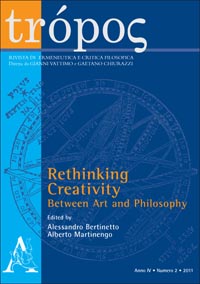Naturalizzare la creatività
Prospettive (attuali) e limiti (futuri)
DOI:
https://doi.org/10.13135/2036-542X/7594Parole chiave:
creativity, naturalization, meta-cognition, insight, aesthetic pleasureAbstract
Questo articolo esplora la possibilità di naturalizzare la creatività. In primo luogo, sviluppa l'attuale prospettiva delle scienze cognitive, contribuendo così alla naturalizzazione dell'atto creativo. Da questo punto di vista, due aspetti primari della creatività (l'intuizione e il piacere estetico) vengono spiegati in termini scientifici. Sulla base dell'evidenza empirica viene verificata una tesi specifica: l'insight e il piacere estetico hanno una matrice comune. Entrambi sono forme di meta-valutazione affettiva, in cui i feedback fenomenici mostrano che i processi creativi si verificano al primo livello della cognizione, nel caso dell'insight sulla risoluzione dei problemi e nel caso del piacere estetico sull'interpretazione delle opere d'arte. In secondo luogo, il presente lavoro elabora una meta-riflessione generale sul naturalismo, suggerendo che: a) un atto creativo non è misterioso, in quanto possiamo comprenderlo attraverso i concetti utilizzati dalla cognizione ordinaria; b) la naturalizzazione ha limiti strutturali. La spiegazione sub-personale non può fornire criteri contestuali per il riconoscimento e ragioni normative per la giustificazione dei prodotti creativi. Questo è il ruolo fondamentale dell'ermeneutica nelle scienze umane. Pertanto, il naturalismo non può essere radicale, altrimenti avrebbe eliminato l'autonomia della storia e della cultura. La creatività può essere compresa solo integrando le scienze cognitive con l'ermeneutica e la spiegazione con l'interpretazione.


